GREENING LAB | ABOUT US
Established in 2016, the Greening Lab is based in the Department of Microbiology at the Monash Biomedicine Discovery Institute, Melbourne, Australia. We are a diverse team of microbiologists, biochemists, ecologists, and bioinformaticians working together to understand the causes and consequences of bacterial persistence within a ‘one health’ framework.
ARC Future Fellow / Group Leader: Professor Chris Greening
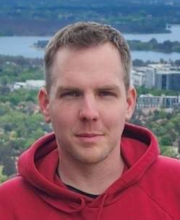 Chris continues to be amazed on a daily basis by the ‘superpowers’ of bacteria. Coming from a working-class background, he completed a first-class degree in Molecular and Cellular Biochemistry at the University of Oxford and undertook a doctorate at the University of Otago, New Zealand investigating the physiological roles of the hydrogenases in mycobacteria. He then gained postdoctoral and lecturing experience at the University of Otago, CSIRO, and Australian National University.
Chris continues to be amazed on a daily basis by the ‘superpowers’ of bacteria. Coming from a working-class background, he completed a first-class degree in Molecular and Cellular Biochemistry at the University of Oxford and undertook a doctorate at the University of Otago, New Zealand investigating the physiological roles of the hydrogenases in mycobacteria. He then gained postdoctoral and lecturing experience at the University of Otago, CSIRO, and Australian National University.
In 2016, he was appointed as a group leader in Monash University’s School of Biological Sciences and completed an environmentally-focused ARC DECRA Fellowship. In 2021, he moved to Monash’s Department of Microbiology to take up a medically-focused NHMRC EL2 Fellowship. Trained in the fields of biochemistry and microbiology, Chris also has experience in genetics, microbial ecology, and molecular evolution, and enjoys working across disciplines. He was awarded the prestigious Fenner Medal from the Australian Academy of Science in 2022. Away from the lab, he enjoys playing piano and saxophone, exploring Australia on his new bike, and getting taken for long walks by his two dogs.
Curriculum Vitae | Wikipedia | ResearchGate | Scholar | Twitter | Email
ARC DECRA Fellow / Group Leader: Dr Rachael Lappan
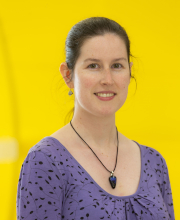 Rachael has come from the human microbiology field, completing her PhD in 2019 at the University of Western Australia on the microbiome of childhood ear infections. Excited to explore the universe of environmental microbiology, she joined the Greening lab in the same year to work on the RISE: Revitalising Informal Settlements and their Environments program. She is also involved in several other projects, exploring the metagenomes of various terrestrial, marine, and host-associated environments with bioinformatics. In 2022, she was awarded an ARC DECRA Fellowship to lead a group to understand the structure, function, and significance of the atmospheric microbiome. When not at work she enjoys hosting board game nights, running Dungeons & Dragons games and looking at photos of other people’s dogs.
Rachael has come from the human microbiology field, completing her PhD in 2019 at the University of Western Australia on the microbiome of childhood ear infections. Excited to explore the universe of environmental microbiology, she joined the Greening lab in the same year to work on the RISE: Revitalising Informal Settlements and their Environments program. She is also involved in several other projects, exploring the metagenomes of various terrestrial, marine, and host-associated environments with bioinformatics. In 2022, she was awarded an ARC DECRA Fellowship to lead a group to understand the structure, function, and significance of the atmospheric microbiome. When not at work she enjoys hosting board game nights, running Dungeons & Dragons games and looking at photos of other people’s dogs.
ARC DECRA Fellow / Group Leader: Dr Pok Man (Bob) Leung
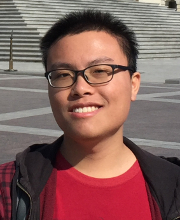 Bob has started a postdoc after a fruitful four-year PhD under Chris’ supervision. Before joining the Greening lab, he was nurtured intellectually in Hong Kong University of Science and Technology (undergrad), Cornell University (exchange), and Scripps Institution of Oceanography (research intern). He is currently studying ecophysiology of microbial communities and their novel metabolic adaptations in extreme ecosystems using culture-dependent and culture-independent approaches. He enjoys suspenseful video games and shows for creative excitement, bothering his cat, and exploring painless ways to stay healthy.
Bob has started a postdoc after a fruitful four-year PhD under Chris’ supervision. Before joining the Greening lab, he was nurtured intellectually in Hong Kong University of Science and Technology (undergrad), Cornell University (exchange), and Scripps Institution of Oceanography (research intern). He is currently studying ecophysiology of microbial communities and their novel metabolic adaptations in extreme ecosystems using culture-dependent and culture-independent approaches. He enjoys suspenseful video games and shows for creative excitement, bothering his cat, and exploring painless ways to stay healthy.
Lab Manager: Tent (Thanavit) Jirapanjawat
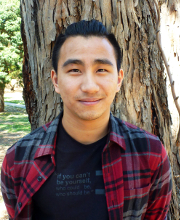 Tent is the full-time research assistant, lab manager, and occasional dog-sitter for the Greening Lab. A graduate of the Australian National University, he did a BSc in Biology and an Honours in Chemistry. During Honours, under Chris’ co-supervision, he studied substrate promiscuity of F420-dependent enzymes in mycobacteria, resulting in three publications. At the Greening Lab, he has been involved in a range of projects in the ecology and physiology spaces. He is currently managing the AMR Testing & Surveillance Facility for the Centre to Impact AMR. In his spare time, he enjoys badminton, playing acoustic guitar, and cooking.
Tent is the full-time research assistant, lab manager, and occasional dog-sitter for the Greening Lab. A graduate of the Australian National University, he did a BSc in Biology and an Honours in Chemistry. During Honours, under Chris’ co-supervision, he studied substrate promiscuity of F420-dependent enzymes in mycobacteria, resulting in three publications. At the Greening Lab, he has been involved in a range of projects in the ecology and physiology spaces. He is currently managing the AMR Testing & Surveillance Facility for the Centre to Impact AMR. In his spare time, he enjoys badminton, playing acoustic guitar, and cooking.
Research Manager: Dr Tess Hutchinson
 Tess is a research officer investigating how climate change impacts primary production and microbial biodiversity in Antarctica. She also manages logistics and fieldwork for the laboratory. In 2018, she completed first-class Honours on a similar topic. Tess enjoys the field work that comes with her project, having visited beaches across Australia and Denmark in the name of research. In 2023, she completely her PhD investigating pathways of organic carbon degradation in permeable marine sediments (sand). In her spare time, Tess enjoys reading, travelling and eating delicious things.
Tess is a research officer investigating how climate change impacts primary production and microbial biodiversity in Antarctica. She also manages logistics and fieldwork for the laboratory. In 2018, she completed first-class Honours on a similar topic. Tess enjoys the field work that comes with her project, having visited beaches across Australia and Denmark in the name of research. In 2023, she completely her PhD investigating pathways of organic carbon degradation in permeable marine sediments (sand). In her spare time, Tess enjoys reading, travelling and eating delicious things.
Human Microbiology Team
Team Leader: Dr Tom Watts
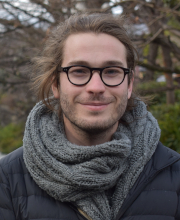
Tom completed his PhD at Monash University under the tutelage of Professor Julian Rood and Dr. Vicki Adams, where he studied plasmid conjugation and incompatibility in the clostridia. Following his PhD, he had a two-year stint as a Research Fellow in sweltering Singapore with Professor Kimberly Kline, where he worked to characterise the mechanisms of bistable pili expression in the opportunistic pathogen Enterococcus faecalis. Tom has returned to Australia to pursue a postdoc in the Greening Lab, where he will go back to his roots by working on clostridia, as well mycobacteria. When Tom is not typing furiously in the office, you can find him playing his guitar, painting bad self-portraits, loitering in local bouldering gyms or pursuing his goal of watching every movie ever made.
Postdoctoral Fellow: Dr Caitlin Welsh
 Caitlin completed her Bachelor of Science at Monash University majoring in Microbiology and Zoology, with a keen interest in bacteria. She joined the Greening lab for an Honours project in 2019 focusing on characterisation of novel lineages of hydrogen-scavenging bacteria. After a bioinformatics-focused research assistant position, she completely a PhD focused on hydrogen metabolism in the human gastrointestinal tract, and is now expanding on this topic in a joint postdoc with the Forster Laboratory. When not at university Cait enjoys travelling as much as possible, spending time in the garden, birdwatching and looking after her many fish.
Caitlin completed her Bachelor of Science at Monash University majoring in Microbiology and Zoology, with a keen interest in bacteria. She joined the Greening lab for an Honours project in 2019 focusing on characterisation of novel lineages of hydrogen-scavenging bacteria. After a bioinformatics-focused research assistant position, she completely a PhD focused on hydrogen metabolism in the human gastrointestinal tract, and is now expanding on this topic in a joint postdoc with the Forster Laboratory. When not at university Cait enjoys travelling as much as possible, spending time in the garden, birdwatching and looking after her many fish.
Research Assistant: Jessica Solari
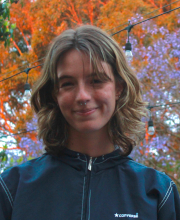 Jess has completed a Bachelor of Science Advanced – Research at Monash University with majors in Microbiology and Biochemistry. After completing an undergraduate project in Greening lab isolating bacterial pathogens from urban water samples, Jess completed an Honours project in 2024 on clostridial hydrogen metabolism. Outside of their studies, Jess loves being out in nature, surfing, hiking, and starting new knitting projects that may never be finished.
Jess has completed a Bachelor of Science Advanced – Research at Monash University with majors in Microbiology and Biochemistry. After completing an undergraduate project in Greening lab isolating bacterial pathogens from urban water samples, Jess completed an Honours project in 2024 on clostridial hydrogen metabolism. Outside of their studies, Jess loves being out in nature, surfing, hiking, and starting new knitting projects that may never be finished.
PhD Student: Thilini Koralegedara
 Thilini completed her Honours at the University of Sri Jayewardenepura, Sri Lanka, and recently gained her masters in Biotechnology as the highest achieving graduate from Swinburne University of Technology. She focused on cloning lipase genes from thermophilic bacteria and analysing the compost fungal microbiome as parts of her research. She joins the Greening lab as a PhD student to uncover the effects of carbon monoxide on Mycobacterium tuberculosis. Thilini likes to explore different parts of the world, experiment with arts and crafts, and de-stress by watching variety shows and cat videos on YouTube.
Thilini completed her Honours at the University of Sri Jayewardenepura, Sri Lanka, and recently gained her masters in Biotechnology as the highest achieving graduate from Swinburne University of Technology. She focused on cloning lipase genes from thermophilic bacteria and analysing the compost fungal microbiome as parts of her research. She joins the Greening lab as a PhD student to uncover the effects of carbon monoxide on Mycobacterium tuberculosis. Thilini likes to explore different parts of the world, experiment with arts and crafts, and de-stress by watching variety shows and cat videos on YouTube.
PhD Student: Warunika Karunasiri
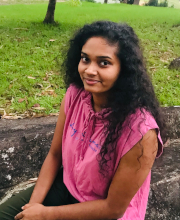 Warunika completed her Bachelor of Science with first-class Honours in Immunology and Integrative Molecular Biology at the University of Colombo, Sri Lanka. She focused on the transcriptional regulation of lipid metabolism in Mycobacterium smegmatis for her honours project under the supervision of Prof. Inoka Perera. She then served as a Teaching Assistant at the same university for four years. In 2024, she joined the Greening lab to research hydrogen metabolism in gut bacteria. Outside lab work, she enjoys traveling, gardening, and cooking.
Warunika completed her Bachelor of Science with first-class Honours in Immunology and Integrative Molecular Biology at the University of Colombo, Sri Lanka. She focused on the transcriptional regulation of lipid metabolism in Mycobacterium smegmatis for her honours project under the supervision of Prof. Inoka Perera. She then served as a Teaching Assistant at the same university for four years. In 2024, she joined the Greening lab to research hydrogen metabolism in gut bacteria. Outside lab work, she enjoys traveling, gardening, and cooking.
Co-Supervised PhD: Charles Nunez
 Charles completed his Honours project with Dr Francesca Short on the persistence mechanisms of nosocomial pathogens, resulting in a first-author publication. He has returned to complete a PhD between the Short and Greening labs on environmental persistence of pathogens. Outside work, as can be expected from his fieldwork gear, he was recently spotted in the front row of Taylor Swift’s latest concert!
Charles completed his Honours project with Dr Francesca Short on the persistence mechanisms of nosocomial pathogens, resulting in a first-author publication. He has returned to complete a PhD between the Short and Greening labs on environmental persistence of pathogens. Outside work, as can be expected from his fieldwork gear, he was recently spotted in the front row of Taylor Swift’s latest concert!
Co-Supervised PhD: Kalani Paranagama
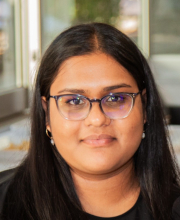 Kalani Paranagama is a computational microbiologist who is completing her PhD at the Wyres and Greening laboratories focusing on metabolic adaptations of Klebsiella pneumoniae. She previously completed a Bachelor of Science degree in Microbiology and Immunology at University of Melbourne before undertaking an Honours degree in Infectious Diseases and Master’s degree in Data Science at Monash University.
Kalani Paranagama is a computational microbiologist who is completing her PhD at the Wyres and Greening laboratories focusing on metabolic adaptations of Klebsiella pneumoniae. She previously completed a Bachelor of Science degree in Microbiology and Immunology at University of Melbourne before undertaking an Honours degree in Infectious Diseases and Master’s degree in Data Science at Monash University.
Aquatic Microbiology Team
Team Leader: Dr Francesco Ricci
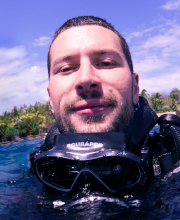 Francesco completed his PhD at the University of Melbourne where he studied population structure and ecophysiology of microbes living in symbiosis with tropical Scleractinian corals. Following his PhD, Francesco developed an interest in understanding how life adapts to extreme environments such as the deep sea and hypersaline lakes. He joined the Greening Lab in 2023, where he will investigate the symbiosis between microbes and deep sea corals and microbial metabolisms in aquatic caves. In his free time, he enjoys the outdoors, underwater diving, rock climbing, camping, cooking and time with family and friends.
Francesco completed his PhD at the University of Melbourne where he studied population structure and ecophysiology of microbes living in symbiosis with tropical Scleractinian corals. Following his PhD, Francesco developed an interest in understanding how life adapts to extreme environments such as the deep sea and hypersaline lakes. He joined the Greening Lab in 2023, where he will investigate the symbiosis between microbes and deep sea corals and microbial metabolisms in aquatic caves. In his free time, he enjoys the outdoors, underwater diving, rock climbing, camping, cooking and time with family and friends.
Postdoctoral Fellow: Dr Astrid Stubbusch
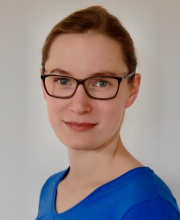 Astrid Stubbusch joined the Greening Group as a postdoctoral researcher in October 2024. She obtained a B.Sc. in Biological Sciences and an M.Sc. in Systems Biology from the University of Heidelberg (Germany), during which she spent time as exchange student and research assistant in Leicester (UK), Cambridge (UK), and Singapore. Astrid completed her PhD at ETH Zürich (Switzerland), focusing on trophic interactions between bacteria and their regulation of polysaccharide degradation in natural ecosystems. Her research interests lie in microbial systems ecology and the ecosystem services provided by microorganisms. In the Greening lab, she will continue research in this area, exploring the hydrogen metabolism in microbial communities of the gut and conducting a systematic study of mixotrophic bacteria with multiple ways for energy acquisition.
Astrid Stubbusch joined the Greening Group as a postdoctoral researcher in October 2024. She obtained a B.Sc. in Biological Sciences and an M.Sc. in Systems Biology from the University of Heidelberg (Germany), during which she spent time as exchange student and research assistant in Leicester (UK), Cambridge (UK), and Singapore. Astrid completed her PhD at ETH Zürich (Switzerland), focusing on trophic interactions between bacteria and their regulation of polysaccharide degradation in natural ecosystems. Her research interests lie in microbial systems ecology and the ecosystem services provided by microorganisms. In the Greening lab, she will continue research in this area, exploring the hydrogen metabolism in microbial communities of the gut and conducting a systematic study of mixotrophic bacteria with multiple ways for energy acquisition.
PhD Student: Thanh Nguyen
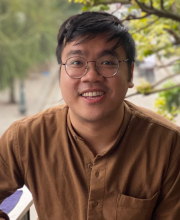 Thanh is studying microbial pathways controlling greenhouse gas emissions in coastal permeable sediments. After completing his Bachelors degree at the University of Science and Technology of Hanoi, he continued his study in the inter-university master programme of Oceans & Lakes in Belgium, where he focused on ecotoxicology and environmental biomonitoring. Before joining the Greening lab, he worked on different projects which examined effects of contaminants like heavy metals and microplastics on physiological health of aquatic organisms. In his free time, Thanh enjoys cooking, painting and learning foreign languages.
Thanh is studying microbial pathways controlling greenhouse gas emissions in coastal permeable sediments. After completing his Bachelors degree at the University of Science and Technology of Hanoi, he continued his study in the inter-university master programme of Oceans & Lakes in Belgium, where he focused on ecotoxicology and environmental biomonitoring. Before joining the Greening lab, he worked on different projects which examined effects of contaminants like heavy metals and microplastics on physiological health of aquatic organisms. In his free time, Thanh enjoys cooking, painting and learning foreign languages.
PhD Student: Jialing Zeng
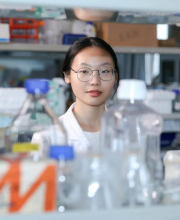 Jialing obtained her Bachelor’s degree in Marine Resources and Environment from Shandong University and earned a Master’s degree in Marine Biology from Xiamen University. During her studies, she developed a strong interest in marine microbiology and microbial ecology, including through a research project on nitrogen fixation in coral reefs. In 2024, she joined the Greening Lab to study chemosynthesis in the marine water column and the interplay between hydrogen metabolism and carbon fixation. In her free time, Jialing enjoys watching documentaries and movies, exploring the outdoors, and trying new restaurants with friends.
Jialing obtained her Bachelor’s degree in Marine Resources and Environment from Shandong University and earned a Master’s degree in Marine Biology from Xiamen University. During her studies, she developed a strong interest in marine microbiology and microbial ecology, including through a research project on nitrogen fixation in coral reefs. In 2024, she joined the Greening Lab to study chemosynthesis in the marine water column and the interplay between hydrogen metabolism and carbon fixation. In her free time, Jialing enjoys watching documentaries and movies, exploring the outdoors, and trying new restaurants with friends.
Co-Supervised PhD: Lucas Barbieri Oliveri
 Lucas received his Bachelor’s degree at the University of Buenos Aires, Argentina, studying the microbial ecology of the Copahue Geothermal System. Passionate about astrobiology and life in the absence of sunlight, he joined the Leung and Greening laboratories in 2024 to study the metabolic basis for microbial survival and dispersal in extreme environments for his PhD. In his free time, he enjoys exploring the outdoors and playing video games.
Lucas received his Bachelor’s degree at the University of Buenos Aires, Argentina, studying the microbial ecology of the Copahue Geothermal System. Passionate about astrobiology and life in the absence of sunlight, he joined the Leung and Greening laboratories in 2024 to study the metabolic basis for microbial survival and dispersal in extreme environments for his PhD. In his free time, he enjoys exploring the outdoors and playing video games.
Microbial Biochemistry Team
Team Leader: Dr Marion Jespersen

Marion completed her MSc and PhD at the Max Planck Institute for Marine Microbiology in Germany under the supervision of Dr Tristan Wagner. Her research focused on the structural and biochemical characterisation of enzymes required for sulfate reduction and carbon transformation in methanogenic archaea and energy-limited anaerobic bacteria.
Fascinated by the realm of metabolic pathways, she moved to Melbourne in February 2024 to lead research into the structure and function of gas-metabolising enzymes. In her free time, Marion enjoys hiking, bouldering, travelling, sending subjectively funny memes to friends and spending time with her family.
EMBO Fellow: Dr Leonard Ernst
 Leo completed his PhD at the Max Planck Institute for Terrestrial Microbiology in Germany under the supervision of Dr. Johannes Rebelein, after graduating from the University of Heidelberg in Biotechnology, Philosophy and Geoscience. His PhD research focused on the discovery of non- enzymatic methane formation pathways as well as the nitrogenase enzyme. Fascinated by the functioning of metalloproteins, he joined the Greening lab to study the evolution and gain-of-function of ancestral hydrogenases, hoping to bridge Geochemistry and Biochemistry. Furthermore, Leo is interested in Politics and History (both reality and Lord of the Rings) and enjoys reading, watching Sci-Fi movies, playing table tennis and spending time with his wife, friends and family.
Leo completed his PhD at the Max Planck Institute for Terrestrial Microbiology in Germany under the supervision of Dr. Johannes Rebelein, after graduating from the University of Heidelberg in Biotechnology, Philosophy and Geoscience. His PhD research focused on the discovery of non- enzymatic methane formation pathways as well as the nitrogenase enzyme. Fascinated by the functioning of metalloproteins, he joined the Greening lab to study the evolution and gain-of-function of ancestral hydrogenases, hoping to bridge Geochemistry and Biochemistry. Furthermore, Leo is interested in Politics and History (both reality and Lord of the Rings) and enjoys reading, watching Sci-Fi movies, playing table tennis and spending time with his wife, friends and family.
JSPS Fellow: Dr Yuka Katayama
 Yuka completed her MSc and PhD in Marine Microbiology at Kyoto University, Japan, studying carbon monoxide-utilizing bacteria in extreme and gut environments. During her PhD, she worked full-time as a researcher at a pharmaceutical company, Shionogi Co. Ltd., developing virus detection methods, viral vectors, and vaccines. In 2025, she joined the Greening lab with support from JSPS Overseas Research Fellowship to study carbon monoxide cycling in the mammalian gut. In her free time, she enjoys hiking and listening to music and podcasts.
Yuka completed her MSc and PhD in Marine Microbiology at Kyoto University, Japan, studying carbon monoxide-utilizing bacteria in extreme and gut environments. During her PhD, she worked full-time as a researcher at a pharmaceutical company, Shionogi Co. Ltd., developing virus detection methods, viral vectors, and vaccines. In 2025, she joined the Greening lab with support from JSPS Overseas Research Fellowship to study carbon monoxide cycling in the mammalian gut. In her free time, she enjoys hiking and listening to music and podcasts.
PhD Student: James Lingford
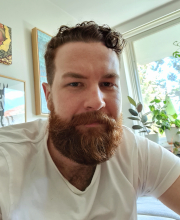 James completed a Bachelor of Science in Genetics (Hons) at the University of Western Australia. Following this he became a research assistant at the Harry Perkins Institute studying RNA binding proteins, and then later moved to Melbourne to be a research assistant at the Walter and Eliza Hall Institute, where he investigated the structure and function of mucosal proteins. James joined the Greening lab as a research assistant in 2023, where he applied his dual genetics and protein biochemistry skills to investigate the weird and wonderful world of gas consuming microbial proteins. He transitioned to a PhD in 2025. James’s personal scientific hero and all-around role model is Richard Lewontin. In his spare time you can find James reading a book while cuddling his two dogs, or discussing a terrible movie with his wife.
James completed a Bachelor of Science in Genetics (Hons) at the University of Western Australia. Following this he became a research assistant at the Harry Perkins Institute studying RNA binding proteins, and then later moved to Melbourne to be a research assistant at the Walter and Eliza Hall Institute, where he investigated the structure and function of mucosal proteins. James joined the Greening lab as a research assistant in 2023, where he applied his dual genetics and protein biochemistry skills to investigate the weird and wonderful world of gas consuming microbial proteins. He transitioned to a PhD in 2025. James’s personal scientific hero and all-around role model is Richard Lewontin. In his spare time you can find James reading a book while cuddling his two dogs, or discussing a terrible movie with his wife.
PhD Student: James Archer
 James completed a Bachelor of Science at Monash University in 2021, doing so with a major in Microbiology and minor in Genetics. In 2022, he joined the Greening Laboratory and completed an Honours project focused on the regulation of hydrogen metabolism in Mycobacterium smegmatis. Following a successful year, James returned to the Greening Laboratory as a temporary research assistant, and will begin a PhD centred around the regulation and assembly of the Huc hydrogenase in M. smegmatis in April of 2023. In his spare time, James enjoys playing basketball, gaming with his friends, and producing music.
James completed a Bachelor of Science at Monash University in 2021, doing so with a major in Microbiology and minor in Genetics. In 2022, he joined the Greening Laboratory and completed an Honours project focused on the regulation of hydrogen metabolism in Mycobacterium smegmatis. Following a successful year, James returned to the Greening Laboratory as a temporary research assistant, and will begin a PhD centred around the regulation and assembly of the Huc hydrogenase in M. smegmatis in April of 2023. In his spare time, James enjoys playing basketball, gaming with his friends, and producing music.
Co-Supervised PhD: Ashleigh Kropp
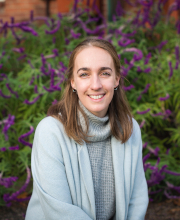 Ash completed her undergraduate, Honours, and Masters of Philosophy degrees at the University of Melbourne/WEHI, writing her thesis on the structural and functional role of specific human kinases that are involved in numerous cancers. In late 2019, Ash joined the Greening lab as a research assistant and achieved the first purification of a high-affinity hydrogenase. Now a PhD student with the Grinter and Greening labs, she primarily works on the biochemistry of hydrogenases in Mycobacterium smegmatis, specifically investigating their structure and their transcriptional regulation. Outside of work, Ash loves yoga and pilates, trashy reality TV, and being with her friends.
Ash completed her undergraduate, Honours, and Masters of Philosophy degrees at the University of Melbourne/WEHI, writing her thesis on the structural and functional role of specific human kinases that are involved in numerous cancers. In late 2019, Ash joined the Greening lab as a research assistant and achieved the first purification of a high-affinity hydrogenase. Now a PhD student with the Grinter and Greening labs, she primarily works on the biochemistry of hydrogenases in Mycobacterium smegmatis, specifically investigating their structure and their transcriptional regulation. Outside of work, Ash loves yoga and pilates, trashy reality TV, and being with her friends.
Terrestrial Microbiology Team
Team Leader: Dr Sophie Holland
 Sophie (they/them) is an environmental microbiologist interested in climate change and the extremes of life. They completed their undergrad and PhD at UNSW Sydney, studying anaerobic organohalide-degrading bacteria, with a particular focus on a novel, dichloromethane-fermenting species. They then moved to Heriot-Watt University in Edinburgh, UK, to investigate the biodegradation of marine microplastics using stable isotope techniques. Sophie came back to Australia in 2023 to join the SAEF (Securing Antarctica’s Environmental Future) team, researching the impact of climate change on Antarctic microorganisms. On the weekend, they enjoy getting out of the city to go hiking, swimming, and camping.
Sophie (they/them) is an environmental microbiologist interested in climate change and the extremes of life. They completed their undergrad and PhD at UNSW Sydney, studying anaerobic organohalide-degrading bacteria, with a particular focus on a novel, dichloromethane-fermenting species. They then moved to Heriot-Watt University in Edinburgh, UK, to investigate the biodegradation of marine microplastics using stable isotope techniques. Sophie came back to Australia in 2023 to join the SAEF (Securing Antarctica’s Environmental Future) team, researching the impact of climate change on Antarctic microorganisms. On the weekend, they enjoy getting out of the city to go hiking, swimming, and camping.
Research Assistant: Eve Tudor-Matthew
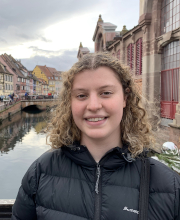 Eve (Evie) (she/they) completed a Bachelor of Science and Bachelor of Arts double degree at Monash University in 2024, with studies in microbiology, molecular biology, and anthropology. She previously spent time in the Greening Lab during a summer vacation scholarship program investigating trace gas oxidation by archaea, as well as for a short bioinformatics-based project investigating antimicrobial resistance in anthropogenic environments. She is currently working primarily on the area of atmospheric microbiology. Outside of work, Eve enjoys playing video games, spending time with her two cats, playing piano, and picking up a new hobby every few months, like crochet and learning the bass guitar.
Eve (Evie) (she/they) completed a Bachelor of Science and Bachelor of Arts double degree at Monash University in 2024, with studies in microbiology, molecular biology, and anthropology. She previously spent time in the Greening Lab during a summer vacation scholarship program investigating trace gas oxidation by archaea, as well as for a short bioinformatics-based project investigating antimicrobial resistance in anthropogenic environments. She is currently working primarily on the area of atmospheric microbiology. Outside of work, Eve enjoys playing video games, spending time with her two cats, playing piano, and picking up a new hobby every few months, like crochet and learning the bass guitar.
PhD Student: Yongyi Peng
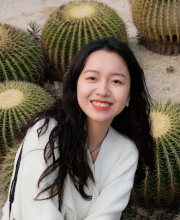 Yongyi completed her undergraduate and Master’s projects at Sun Yat-sen University in Marine Biology, focusing on the evolutionary trajectories of microorganisms and their viruses in deep-sea cold seep sediments. She joins the Greening lab to study multi- trophic interactions in Antarctic soils, particularly intra-bacterial warfare and bacteria- phage interactions. In her free time, she enjoys watching variety shows, reading novels, and other relaxing activities.
Yongyi completed her undergraduate and Master’s projects at Sun Yat-sen University in Marine Biology, focusing on the evolutionary trajectories of microorganisms and their viruses in deep-sea cold seep sediments. She joins the Greening lab to study multi- trophic interactions in Antarctic soils, particularly intra-bacterial warfare and bacteria- phage interactions. In her free time, she enjoys watching variety shows, reading novels, and other relaxing activities.
Co-Supervised PhD: Parth Sharma
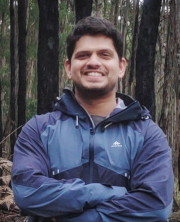 Parth completed his Bachelor of Science and Master of Science in Biotechnology from Veer Narmad South Gujarat University, and Madurai Kamaraj University respectively. During his postgraduation dissertation, he studied secondary metabolite production from endophytic fungi. Following his Masters, he worked on multiple research projects exploring microbiomes of hotspring (Gujarat Biotechnology Research Centre), river (National Institute of Oceanography), and marine (Gujarat Technological University) environments. In his PhD project at the Lappan and Greening groups, he is investigating microbial primary succession in meteorites and glacier forelands via culture-independent techniques. In his free time, he likes to train in the gym for field work, play video games, binge watch, and relax with friends.
Parth completed his Bachelor of Science and Master of Science in Biotechnology from Veer Narmad South Gujarat University, and Madurai Kamaraj University respectively. During his postgraduation dissertation, he studied secondary metabolite production from endophytic fungi. Following his Masters, he worked on multiple research projects exploring microbiomes of hotspring (Gujarat Biotechnology Research Centre), river (National Institute of Oceanography), and marine (Gujarat Technological University) environments. In his PhD project at the Lappan and Greening groups, he is investigating microbial primary succession in meteorites and glacier forelands via culture-independent techniques. In his free time, he likes to train in the gym for field work, play video games, binge watch, and relax with friends.
Honours Student: Tyler Langevin
 Tyler is currently completing his Honours year of a Bachelor of Science Advanced – Global challenges, majoring in genetics with a minor in microbiology. His undergraduate project investigated the role of trinucleotide repeat expansion in causing diseased plant phenotypes. His Honours project examines the genomic profile and metabolic capability of potentially novel microbial communities at coal seams. In his free time, Tyler loves to play and coach volleyball, cook, and listen to music.
Tyler is currently completing his Honours year of a Bachelor of Science Advanced – Global challenges, majoring in genetics with a minor in microbiology. His undergraduate project investigated the role of trinucleotide repeat expansion in causing diseased plant phenotypes. His Honours project examines the genomic profile and metabolic capability of potentially novel microbial communities at coal seams. In his free time, Tyler loves to play and coach volleyball, cook, and listen to music.
Honours Student: Tynan Brennan
 Tynan is currently completing his Honours in the Bachelor of Science – Global Challenges course, focusing on environmental chemistry. Coming from a geographical science background, Tynan enjoys understanding the biogeochemistry of unique environments and is passionate about climate change and science communication. His Honours project (with Joy and Tyler) investigates the environment and ecology of a site which may support novel syngas-consuming microbes. In his free time, Tynan loves surfing, playing football (AFL), and obsessing over sports.
Tynan is currently completing his Honours in the Bachelor of Science – Global Challenges course, focusing on environmental chemistry. Coming from a geographical science background, Tynan enjoys understanding the biogeochemistry of unique environments and is passionate about climate change and science communication. His Honours project (with Joy and Tyler) investigates the environment and ecology of a site which may support novel syngas-consuming microbes. In his free time, Tynan loves surfing, playing football (AFL), and obsessing over sports.
Industrial Microbiology Team
Team Leader: Dr Surbhi Jain
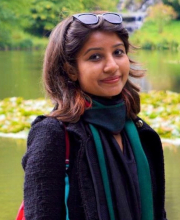 Coming from a background in anaerobic microbiology, Surbhi completed her PhD in 2022 in the research group of Prof. Dr. Volker Müller at Johann Wolfgang Goethe University, Frankfurt, Germany. She genetically modified the acetogenic bacterium Thermoanaerobacter kivui, which grows on C1 gases to produce value-added chemicals such as acetate, ethanol, or formate. She is passionate about climate change research and is continuing to work with industry-focused research in the Greening lab, focusing on conversion of greenhouse gases into sustainable animal feeds using mixotrophic bacteria. In her spare time, Surbhi likes to do yoga and go biking.
Coming from a background in anaerobic microbiology, Surbhi completed her PhD in 2022 in the research group of Prof. Dr. Volker Müller at Johann Wolfgang Goethe University, Frankfurt, Germany. She genetically modified the acetogenic bacterium Thermoanaerobacter kivui, which grows on C1 gases to produce value-added chemicals such as acetate, ethanol, or formate. She is passionate about climate change research and is continuing to work with industry-focused research in the Greening lab, focusing on conversion of greenhouse gases into sustainable animal feeds using mixotrophic bacteria. In her spare time, Surbhi likes to do yoga and go biking.
Postdoctoral Fellow: Dr Anthony Kohtz
 Anthony completed his PhD at Montana State University in the lab of Roland Hatzenpichler. His research involved the characterization of archaeal groups inhabiting hot springs in Yellowstone National Park. In particular, he cultured several divergent classes of methanogens in the phylum Thermoproteota for the first time, validating that methanogenesis extends beyond traditional Euryarchaeota methanogens. Anthony joined the Greening lab in 2025 to focus on the diversity, biochemistry, and structure of novel gas-metabolizing enzymes in syngas-consuming bacteria and methanogenic archaea. In his free time, Anthony enjoys hiking, camping, photography, and watching movies that are so bad they’re good.
Anthony completed his PhD at Montana State University in the lab of Roland Hatzenpichler. His research involved the characterization of archaeal groups inhabiting hot springs in Yellowstone National Park. In particular, he cultured several divergent classes of methanogens in the phylum Thermoproteota for the first time, validating that methanogenesis extends beyond traditional Euryarchaeota methanogens. Anthony joined the Greening lab in 2025 to focus on the diversity, biochemistry, and structure of novel gas-metabolizing enzymes in syngas-consuming bacteria and methanogenic archaea. In his free time, Anthony enjoys hiking, camping, photography, and watching movies that are so bad they’re good.
PhD Student: Nadeesha Athukorala
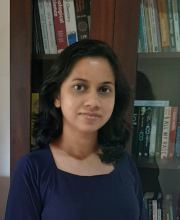 Nadeesha’s research research focuses on enhancing methane removal and protein production using proteobacterial and verrucomicrobial methanotrophs. During her B.Sc. Honours in Molecular Biology and Biotechnology at the University of Peradeniya in Sri Lanka, she identified a lipolytic Trichoderma sp. and characterized its lipase. She then spent one and a half years as a Teaching and Research Assistant at the University of Peradeniya, where she studied Cryptosporidium species infecting kidney transplant patients and zoonotic diseases in Sri Lanka. She joined the Greening Lab as a PhD student in February 2023. Nadeesha enjoys reading novels and going on road trips in her leisure time.
Nadeesha’s research research focuses on enhancing methane removal and protein production using proteobacterial and verrucomicrobial methanotrophs. During her B.Sc. Honours in Molecular Biology and Biotechnology at the University of Peradeniya in Sri Lanka, she identified a lipolytic Trichoderma sp. and characterized its lipase. She then spent one and a half years as a Teaching and Research Assistant at the University of Peradeniya, where she studied Cryptosporidium species infecting kidney transplant patients and zoonotic diseases in Sri Lanka. She joined the Greening Lab as a PhD student in February 2023. Nadeesha enjoys reading novels and going on road trips in her leisure time.
Honours Student: Joy (Ming-Shing) Fan
 Joy is currently is completing a Bachelor of Science Advanced – Global Challenges at Monash University, focusing on Microbiology. She is passionate about how developments made in Microbiology can address global issues such as climate change and waste management, and thus is thoroughly enjoying her time at Greening Lab. Her undergraduate project investigated atmospheric trace gas oxidation by extremophiles, while her Honours project is investigating novel syngas-consuming microbes. In her free time, Joy loves bouldering, skateboarding, and trying new recipes on unsuspecting dinner guests.
Joy is currently is completing a Bachelor of Science Advanced – Global Challenges at Monash University, focusing on Microbiology. She is passionate about how developments made in Microbiology can address global issues such as climate change and waste management, and thus is thoroughly enjoying her time at Greening Lab. Her undergraduate project investigated atmospheric trace gas oxidation by extremophiles, while her Honours project is investigating novel syngas-consuming microbes. In her free time, Joy loves bouldering, skateboarding, and trying new recipes on unsuspecting dinner guests.
Co-Supervised PhD: Igor da Silva
 Igor completed his undergraduate and Master at Universidade de São Paulo (Brazil) in Materials Engineering, writing his thesis on the hydrophobic influence in amphiphilic polymers to synthesize antimicrobial silver nanoparticles. He joined Junkers and Greening labs to study the synthesis of peptide-mimicking polymers which present antimicrobial properties. In his free time, he enjoys cooking and (urban) hiking.
Igor completed his undergraduate and Master at Universidade de São Paulo (Brazil) in Materials Engineering, writing his thesis on the hydrophobic influence in amphiphilic polymers to synthesize antimicrobial silver nanoparticles. He joined Junkers and Greening labs to study the synthesis of peptide-mimicking polymers which present antimicrobial properties. In his free time, he enjoys cooking and (urban) hiking.
Lab Alumni
- Blair Ney: Research Assistant, 2017 – 2018. Currently registrar at St Vincent’s Hospital.
- Joanna Feng: Honours Student, 2017. Currently laboratory technician at Generation Victoria.
- Dr Tom Lines: Research Assistant, 2018. Currently postdoctoral fellow at University of Adelaide.
- Dr Maria Chuvochina: Research Assistant, 2018. Currently research assistant at University of Queensland.
- Dr Karen Jordaan: Visiting Postdoctoral Fellow, 2018 – 2019: Currently postdoctoral fellow at Pontificia Universidad Católica (Chile).
- A/Prof Osnat Gillor: Sabbatical, 2019. Currently group leader at Ben Gurion University of the Negev.
- Dr Ya-Jou Chen: PhD student, 2016-2020. Currently assistant professor at Duke Kunshan University.
- Dr Zahra Islam: PhD student, 2017-2020. Currently postdoctoral fellow at University of Melbourne.
- Guy Shelley: Honours Student, 2018 and Research Assistant, 2019. Currently ELP Graduate at Services Victoria.
- Katie Bayly: Honours Student, 2018. Currently customer service representative.
- Dr Eleonora Chiri: Postdoctoral fellow, 2017-2020. Currently founder of AgroMini, Italy.
- Dr Rhys Grinter: Postdoctoral fellow, 2018-2020. Currently group leader at Monash University.
- Abraham Freijah: Honours Student, 2019-2020. Currently technical assistant at Doherty Institute.
- Jie Mao: Intern, 2020-2021. Currently bioinformatician at Children’s Cancer Institute.
- Dr Sarah Reeve: Co-supervised PhD student, 2017-2021. Currently environmental consultant at Prensa Ltd.
- Dr Paul Cordero: PhD student, 2017-2021. Currently postdoctoral fellow at Aachen University, Germany.
- Anjali Lobo: Honours student, 2020.
- Dr Laura Perlaza-Jimenez: Postdoctoral fellow, 2020-2021. Currently bioinformatician at Monash Bioinformatics Platform.
- Nhu Quynh Doan: Intern, 2021-2022. Currently technical assistant at Alfred Health.
- Dr Laura Woods: Postdoctoral fellow, 2021-2022. Currently bioinformatician for National Center for Agricultural and Food Research and Technology, Spain.
- Michael Milton: Bioinformatician, 2021-2022. Currently research computer engineer at Walter and Eliza Hall Institute.
- Isabelle Magnin-Bougma: Honours Student, 2022. Currently research technician at Monash University.
- Luis Jimenez: Research Assistant, 2020-2023. Currently lab manager at Monash University.
- Dr Sean K. Bay: PhD Student, 2016-2020 and postdoctoral fellow, 2020-2022. Currently ARC DECRA Fellow and lecturer at La Trobe University.
- Dr David Gillett: PhD Student, 2019-2023. Currently postdoctoral fellow at University of Houston, Texas.
- Justin Davis: Masters Student, 2023.
- Montgomery Hall: Undergraduate and Honours Student, 2021-2023. Currently Bushland Officer, Knox City Council.
- Maha Alharba: Co-supervised PhD student. 2020-2024.
- Addam Corallo, Honours Student. 2024.
- Dr Gaofeng Ni, Postdoctoral Fellow, 2022-2024.
- Dr Oliver Schmidt, Visiting Postdoctoral Fellow, 2024. Currently postdoctoral fellow at Arctic University of Norway.
- Dr Ning Hall, Co-Supervised PhD Student, 2021-2025.